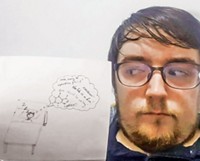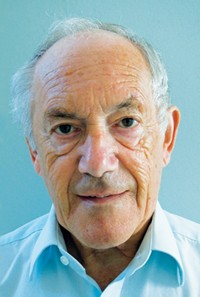Advertisement
Grab your lab coat. Let's get started
Welcome!
Welcome!
Create an account below to get 6 C&EN articles per month, receive newsletters and more - all free.
It seems this is your first time logging in online. Please enter the following information to continue.
As an ACS member you automatically get access to this site. All we need is few more details to create your reading experience.
Not you? Sign in with a different account.
Not you? Sign in with a different account.
ERROR 1
ERROR 1
ERROR 2
ERROR 2
ERROR 2
ERROR 2
ERROR 2
Password and Confirm password must match.
If you have an ACS member number, please enter it here so we can link this account to your membership. (optional)
ERROR 2
ACS values your privacy. By submitting your information, you are gaining access to C&EN and subscribing to our weekly newsletter. We use the information you provide to make your reading experience better, and we will never sell your data to third party members.
Education
Movers And Shakers
Irving Rothman
English professor and scholar of 18th-century literature says business writing is all about clarity and precision
by Marc S. Reisch
May 5, 2008
| A version of this story appeared in
Volume 86, Issue 18

IRVING N. ROTHMAN is an expert on Daniel Defoe, the 18th-century English author of "Robinson Crusoe." His knowledge of the author of a novel about a shipwrecked man who learns to survive on a deserted island would not imply a keen interest in crisp business prose. But like the author he has studied so intently, Rothman has a sharp interest in the world around him, including the craft of writing technical manuals that spell out protocols for hazardous industrial procedures.
Not every humanist sees creativity and rigor in the art of technical writing. But Rothman, an English professor at the University of Houston for the past 40 years, does, and he has penned his share of it.
He has written procedural manuals and taught technical writing classes for chemical companies such as LyondellBasell and engineering firms such as KBR and Fluor. And for a number of years, he has edited the annual report of the Institute for Space Systems Operations, a unit at the university where faculty collaborate with researchers at the NASA-Johnson Space Center.
While Rothman has lectured on 18th-century prose and other literature at the university, he has also taught classes such as "Business and Professional Writing" for engineering students. Necessity, he says, had a hand in offering him the opportunity to write procedural manuals.
Rothman points out that there is no shortage of chemical firms around Houston. And given the need to supplement his academician's salary so he could put his children through college, Rothman hired himself out for a number of years as an independent consultant. He sought and obtained teaching and writing jobs from local companies to supplement his university pay.
Although the extra income may have motivated Rothman to explore technical writing, "the experience broadened my horizons," he says. He quickly learned that many business-writing textbooks are "totally unrealistic" because they teach a student how to write documents intended for a firm's president or its executives.
Creating a technical document intended to clarify industrial operating procedures and prevent loss of life means writing coherent step-by-step accounts for production-line workers. Writing such a document means getting out from behind a desk and going into the field.
In one case, Rothman had to document work procedures involving pipeline maintenance and operation. He followed a worker, a Louisiana Cajun whose technical vocabulary was limited but who was an expert at his job. Rothman watched the man work and listened to him describe how he "did this and that." An engineering student accompanied Rothman to help him translate the worker's simple descriptions into more precise technical language.
Many of the procedures Rothman documented involved treacherous tasks. And so the manuals he wrote included cover pages with descriptions of dangers that workers might encounter, such as explosions and hazardous gases. To be absolutely clear, the manuals also had to be written at an eighth-grade level with simple words and short sentences.
He imparts some of the practical knowledge he has gained to students at the University of Houston through the business-writing course he teaches. The class focuses on techniques students can employ to write business letters and proposals, policy manuals, and technical specification documents. Twelve years ago, the university's engineering department asked the English department to offer such a course; Rothman volunteered and has taught it sporadically ever since.
Students attracted to the class are "inventive and creative," he says. "Many are engineering students, computer science students, and architecture students. They know how things work." The course requires students to write documents needed in industry rather than essays on English literature. "The course is rewarding and allows me to meet a number of bright students in differing fields." Rothman says his class teaches students to clearly communicate what they know about how things work. "Generally, students' writing is too vague," he says.
He starts the course by asking students how much they pay for a gallon of gasoline. Those who volunteer an answer will quote dollars and cents but leave off the nine-tenths of a cent that gas stations also typically charge. The lesson, Rothman says, is that "they must be more explicit in the way they think and write."
SOME OF THE STUDENTS come to his class without a firm grasp of the English language. More than half of the students he encounters are native speakers of Chinese, Korean, and other Asian languages, or they speak Spanish as their first language. Chinese students in particular have a hard time with English, Rothman notes. "They are very bright students, but it takes them on average six years to learn how to handle English properly," he says.
Discussing technical-writing technique, Rothman says, "The passive voice is not anathema. It becomes somewhat essential, particularly in the description of operating processes and chemical reactions." He notes that "many chemical processes, for instance, 'are affected' by a catalyst," and it is correct to say so. "It's a matter of style. I wouldn't object to the passive voice when it becomes the best way of saying something," he concedes.
Many of the students who take Rothman's writing class might feel a bit like Robinson Crusoe. Schooled in science and engineering, they find themselves marooned when it comes to concise technical or business writing. But a professor of 18th-century English literature who has been a technical writer himself can throw his students a life preserver. They already have practical knowledge; he teaches them to write it down clearly and explicitly.





Join the conversation
Contact the reporter
Submit a Letter to the Editor for publication
Engage with us on Twitter